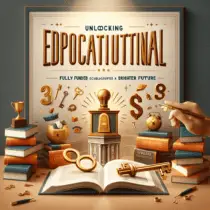Scholarships play a crucial role in helping students achieve their educational goals. However, the competition for scholarships is often fierce, with numerous talented individuals vying for limited funding. In this challenging landscape, crafting a winning scholarship essay can make all the difference. The art of crafting a successful scholarship essay lies in the ability to convey one’s unique qualities and experiences effectively, while also adhering to the guidelines set forth by the scholarship committee.
Unveiling the art of crafting winning scholarship essays requires a strategic approach that combines creativity, authenticity, and attention to detail. By understanding what sets a winning essay apart from the rest, aspiring scholarship recipients can increase their chances of securing financial aid for their education.
Understanding the Purpose
Before diving into the process of writing a scholarship essay, it is essential to understand its purpose. Scholarship committees aim to identify students who not only excel academically but also exhibit exceptional qualities such as leadership, perseverance, and community involvement. They seek individuals who will make a positive impact on society and contribute to their chosen field of study.
Your scholarship essay should showcase your unique attributes and experiences that align with these criteria. It is an opportunity to demonstrate your personal growth, resilience, and determination while highlighting your goals and aspirations.
Researching the Scholarship
A crucial step in crafting a winning scholarship essay is thoroughly researching the scholarship itself. Each scholarship has specific requirements and evaluation criteria that applicants must meet. By understanding these guidelines, you can tailor your essay to address what the committee is looking for.
Visit the official website of the scholarship provider and familiarize yourself with their mission statement, core values, eligibility criteria, and any specific prompts or questions they require applicants to address. By doing so, you can align your essay with their values and demonstrate your suitability as a scholarship recipient.
Brainstorming and Outlining
Once you have a clear understanding of the scholarship requirements, it is time to brainstorm ideas and create an outline for your essay. Begin by reflecting on your personal experiences, achievements, challenges, and goals.
Jot down any ideas that come to mind and consider how they relate to the scholarship’s desired qualities. Focus on specific examples that highlight your strengths and provide concrete evidence of your skills and accomplishments.
Organize your thoughts into a structured outline that includes an introduction, body paragraphs addressing key points, and a meaningful conclusion. This will serve as a roadmap for writing the essay and ensure a logical flow of ideas.
Captivating Introduction
The opening paragraph of your scholarship essay is crucial in capturing the reader’s attention. Start with an engaging hook that grabs their interest and compels them to continue reading. This could be an intriguing statistic, a thought-provoking question, or a compelling anecdote related to your field of study or personal journey.
After capturing their attention, introduce yourself briefly and explain why you are applying for the scholarship. Clearly state your educational goals and how receiving the scholarship will help you achieve them. Tailor this section to align with the values and objectives of the scholarship provider.
Showcasing Personal Experiences
The body paragraphs of your scholarship essay should focus on showcasing your personal experiences in relation to the desired qualities outlined by the scholarship committee. Use specific examples from your life that demonstrate these qualities in action.
For instance, if leadership is one of the criteria, discuss a time when you took charge of a group project or organized an event. Highlight any obstacles you encountered and how you overcame them through determination and effective problem-solving.
Remember to use active voice throughout your essay, demonstrating agency and ownership of your achievements and experiences. Instead of saying, “I was given the opportunity to lead,” say, “I seized the opportunity to lead.”
Demonstrating Impact and Future Goals
In addition to showcasing your past experiences, it is important to emphasize the impact these experiences have had on your personal growth and development. Share how these experiences have shaped you into the person you are today.
Furthermore, discuss your future goals and how receiving the scholarship will contribute to their realization. Explain how you plan to utilize your education to make a positive impact on society and inspire others in your field.
Polishing Your Essay
Once you have written the initial draft of your scholarship essay, it is crucial to revise and edit it thoroughly. Pay attention to grammar, punctuation, and spelling errors. Ensure that each paragraph flows smoothly into the next, maintaining a coherent structure.
Read your essay aloud or ask someone else to read it for you. This will help identify any awkward phrases or areas that need improvement.
Frequently Asked Questions
Q: How long should a scholarship essay be?
A: Scholarship essay lengths vary depending on the specific scholarship provider’s requirements. However, most essays fall between 500-1,000 words. Be sure to read and adhere to the word count limits stated in the scholarship guidelines.
Q: How can I make my essay stand out from others?
A: To make your essay stand out, focus on showcasing your unique qualities and experiences. Avoid generic statements and provide specific examples that illustrate your strengths. Additionally, ensure that your essay aligns with the scholarship provider’s values and objectives.
Q: Can I reuse the same scholarship essay for multiple applications?
A: While it may be tempting to reuse the same essay for multiple scholarship applications, it is generally not recommended. Each scholarship has its own set of requirements and evaluation criteria, so tailoring your essay to each specific scholarship will increase your chances of success.
Q: Should I include personal anecdotes in my essay?
A: Personal anecdotes can be powerful tools to make your essay more engaging and memorable. However, make sure that the anecdotes are relevant to the prompt or question being asked and support the overall theme of your essay.
Q: How important is proofreading?
A: Proofreading is essential in ensuring that your essay is free from grammatical errors, spelling mistakes, and typos. It demonstrates your attention to detail and commitment to producing a polished piece of writing.
In conclusion, crafting a winning scholarship essay requires careful planning, research, and effective storytelling. By understanding the purpose of the essay, tailoring it to fit the scholarship requirements, showcasing personal experiences, and demonstrating impact and future goals, aspiring students can increase their chances of securing valuable financial aid for their education.






